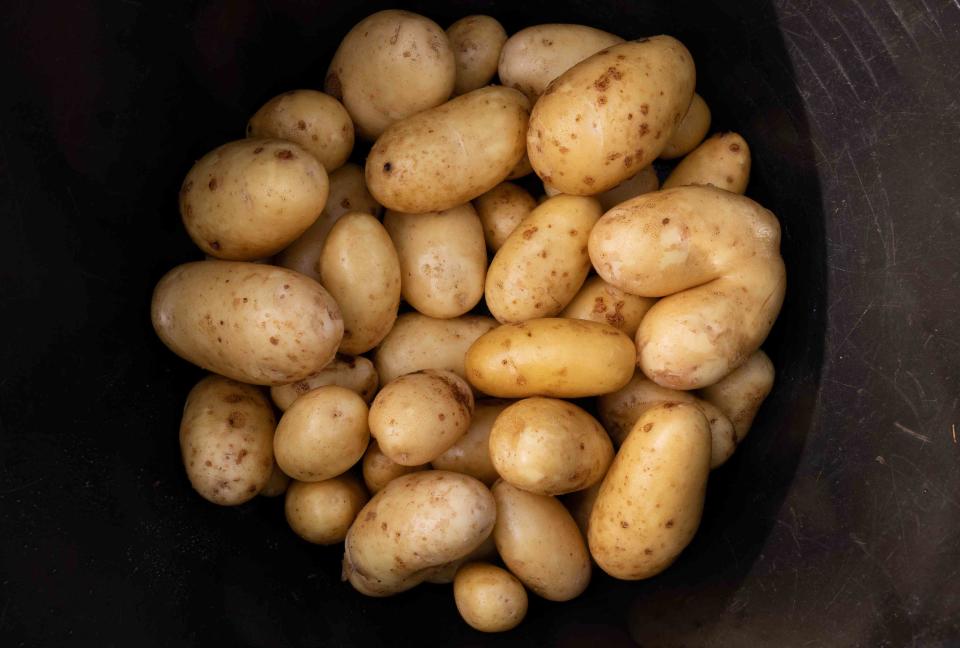Why You Should Never Store Your Potatoes in the Refrigerator
How long do potatoes last? Are potatoes with “eyes” okay to eat? Here’s everything you need to know about storing your spuds properly.

Laurent Renault / 500px / Getty Images
Whether transformed into a simple mash, crispy latkes, or pillowy gnocchi, potatoes are endlessly versatile. Lucky for potato fans, they last for a long time.
“Potatoes are a forgiving vegetable when it comes to storage, but there are a few ways to increase their longevity,” says Rob Sweatman, executive vice president of operations and agriculture at The Little Potato Company. Here’s how to store potatoes properly to extend their shelf life.
Related: Our 40 Best Potato Recipes
How to store potatoes
Potatoes should be stored in a cool, dry, and dark place with minimal light exposure to maintain freshness and prevent spoilage. At home, the best place is likely your pantry, but be sure to situate them in a central location so you don’t forget about them in the depths of your cabinets.
Avoid storing potatoes in the refrigerator or under the sink — a moist environment can cause the spuds to sprout prematurely. The refrigerator can also cause the potatoes’ starches to convert to sugars, which will make your potatoes sweeter and gritty in texture. What’s more, the refrigerator can cause increased levels of the chemical acrylamide during cooking, which has been linked to some cancers, according to the U.S. Food and Drug Administration (FDA).
One more thing: While they feature together in plenty of recipes, you’ll want to keep potatoes away from onions in the pantry. Onions produce ethylene gas, which can cause potatoes to spoil, and the high moisture content of potatoes can cause onions to turn mushy.

Maxwell Cozzi
How long do potatoes last?
If stored properly at room temperature, potatoes will last for one to two weeks before their quality begins to deteriorate. If the potatoes are firm to the touch, have a smooth skin, and are free of bruising or discoloration, they’re safe to cook with and consume.
When potatoes start to go bad, there will be visible signs. If there is any notable discoloration, you should compost or discard the potatoes altogether. A green hue is a sign that potatoes are going bad and will have a bitter taste. Similarly, any internal dark spots are a sign of decay.
Related: How to Compost at Home
Are potatoes with “eyes” still okay to eat?
Potatoes that have begun to sprout “eyes” may resemble a science experiment gone wrong, but there’s no harm in cooking with them — so long as you remove the sprouts before cooking. “Potatoes with a lot of sprouts will start to deplete in nutritional value, so I recommend cooking your potatoes before they’ve reached the sprouting stage,” says Sweatman.
What causes these spindly sprouts to grow, anyway? “Sprouting typically occurs if your potatoes are kept in a place that’s too warm, such as a sunny spot on your kitchen counter or if they are exposed to moisture,” says Sweatman.
Related: How to Store Any Vegetable to Keep It Fresh
What’s the right container for potatoes?
You shouldn’t store potatoes loose in the pantry, as they might roll around and bruise. Instead, store potatoes in breathable containers such as paper bags, baskets, or cardboard boxes for proper ventilation. “Potatoes need to breathe to stay healthy and fresh, so you need to make sure the bag allows airflow,” says Sweatman.
For more Food & Wine news, make sure to sign up for our newsletter!
Read the original article on Food & Wine.

